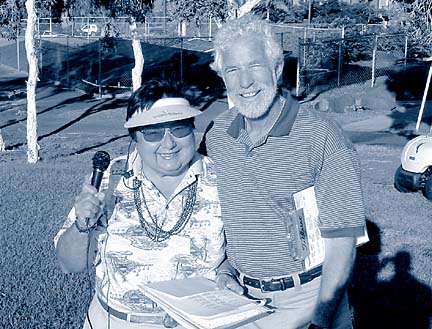Advertisement - Click to support our sponsors.


FBI investigating
Pro Tour Hawaii
shutdown and
missing $700,000
Tour officials blame each other
as golfers are told there are
no funds for the remaining
7 tournamentsBy Pat Bigold
Star-BulletinThe FBI has confirmed it's looking into the sudden financial collapse of Pro Tour Hawaii.
UPDATE In 2006, Pro Tour Hawaii's former chief financial officer Gregg V. Wood was convicted of defrauding the business and its owners Sandy and Tina Mohr. Wood was sentenced to federal prison but his conviction was overturned on appeal in 2007.
—Honolulu Star-Advertiser
For subsequent coverage of this case, see:
» March '05:
Scammed golfers have shot at par» June '06:
Golf tour backer convicted of fraud» Oct. '06:
Man gets 21 months for collapse of golf tour» Jan. '08:
Hawaii fraud victims won't be repaid $62,675
The tour, which had a prize purse of about $100,000 for each of its 10 tournaments and was being taped by CNBC, was canceled this week after only three events.
At issue is about $700,000. No one can say exactly how much, but the 60 or more golfers who each paid an $11,500 entry fee are upset.
"Whoever took the money should be arrested, prosecuted, thrown in jail," said Kevin Hayashi, who won the first tournament and was the only winner able to cash his prize check.
Hayashi said the tour organizers still owe him his entry fee as well as $11,000 more he earned after the first week.
After confirming his agency's interest in the matter, FBI spokesman John Gillis would not comment further.
He said more information could be available next week.
Many say it's a black eye on the sport that will take a long time to heal.
Sandy Mohr, a Kona resident who is president and chief executive of the tour, reportedly told players at midweek that there were no more funds to continue the tournaments.
"He read a prepared statement but it was very vague with very few answers," said Casey Brown of Arkansas, who knows he may never see the $18,500 due him for winning the third tournament.
Players said they had to seek out Mohr to find out why their checks from the second tournament were bouncing this week.
Brown said that during a meeting with FBI agents yesterday morning, Mohr blamed the tour's chief financial officer, Greg Wood, a Maui resident.
But Wood, in a phone interview with the Star-Bulletin, pointed the finger at Mohr.
Mohr could not be reached at either of two phone numbers.
Wood, unlike Mohr, has yet to speak with the FBI. But he said, "I'm not hiding."
Wood, who also claimed he hasn't been compensated for his work, said he runs a development firm in Florida and is involved with several other businesses.
"We don't have enough to know what is really going on," said Brown. "Obviously, we don't know who to trust."
He said that it was a player who initiated contact with the FBI but would not disclose which one.
The golfers, mostly from the mainland, also had to pay their own expenses.
The abrupt end of the tour also put Ko'olau Golf Club pro Rob Nelson in a bind. He had blocked off four days for the next event and said his club now stands to lose $20,000.
In an attempt to recoup his loss, Nelson said he is offering tee times during the open period at $35 instead of the usual $54.
"They have to be local, and they have to mention the pro tour gap," he said.
A number of players dug deep to come up with the fee they now are not sure they'll ever recover.
"It ruins your trust in people," said Brown.
"Some brought their families and their caddies," said Jay Shannon, a tour participant from Kaneohe. "Some quit their jobs to come. Some took leaves of absence. It was all based on the idea that they would play 10 tournaments and now nothing is going to happen."
Robert Wallace, 28, quit his job as a pro at a Maryland golf club to come here and play in his first mini tour.
"Once I saw the mini tour was out here, I put everything I had into it," said Wallace.
"I lie in bed and try to decide what I do next. Every day here, I'm shelling out another $100 or $150 with no possible income."
Players said checks from the first week of play went through.
But Kevin Carll of the Big Island, whose wife is expecting a baby in July, not only lost his entry fee but never got around to cashing even his first week's check.
Shannon put the entry fee on his Visa card, and now hopes he'll be credited.
Another golfer reportedly borrowed from his retirement fund while others took out loans.
Brown got his fee money from a sponsor, and now worries that losing it will affect his relationship with that sponsor.
The only money he has in the bank from this trip is the $1,140 he won the first week.
Brown said he was annoyed to hear Mohr suggest to him that he might be able to revive the tour next year.
"I said, come on, are you kidding? Who's going to come back?" Brown asked. "Unbelievable he can even think that now."
Brown said that the entry fee funds were supposed to be used only for "overhead expenses."
"The prize purse was supposed to come from sponsors," he said.
"Look at their Web pages, you see big corporate sponsors like CNBC, Nextel. We don't know exactly the numbers here. You'd have to look at his books to see where he keeps his money to know, where it's going, where it's coming from."
The Web site was shut down. It was www.protourhawaii.com .